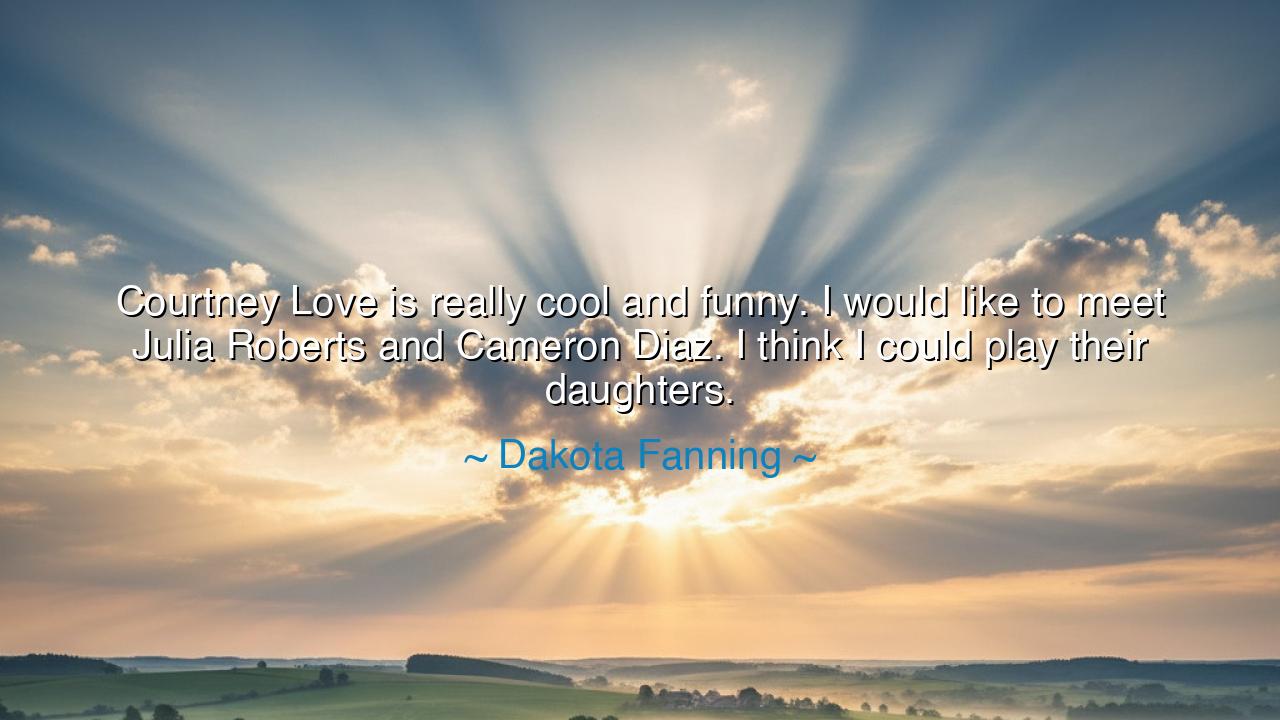
Courtney Love is really cool and funny. I would like to meet
Courtney Love is really cool and funny. I would like to meet Julia Roberts and Cameron Diaz. I think I could play their daughters.






In the grand tapestry of human connection, there is a powerful truth that transcends time: we are all shaped by the role models we encounter and the relationships we aspire to form. Dakota Fanning’s words, "Courtney Love is really cool and funny. I would like to meet Julia Roberts and Cameron Diaz. I think I could play their daughters," reveal more than just a desire to meet famous figures; they speak to the universal human yearning for connection, for the opportunity to engage with those whose lives or work we admire. Through Fanning’s admiration for Courtney Love, Julia Roberts, and Cameron Diaz, we are reminded of the timeless importance of role models—those individuals who inspire us to reach beyond our current limitations and to dream of what we can one day become.
In the ancient world, the search for mentors and role models was at the core of the young person's journey to wisdom and self-discovery. The philosopher Aristotle, in his treatise on ethics, emphasized the importance of virtue and how it is cultivated through association with those who exhibit noble qualities. To surround oneself with the right people, Aristotle taught, is to place oneself in the path of greatness. Fanning’s wish to meet Roberts, Diaz, and Love reflects this ancient wisdom—she seeks the influence of those who have forged successful paths, in the hope that their presence will shape her journey in meaningful ways. Mentorship, then, is not just about gaining access to individuals, but about connecting with their energy, their creativity, and their wisdom.
The ancient Greeks also valued the role of narrative in shaping the individual. Homer’s epic poems, The Iliad and The Odyssey, provide examples of heroes and gods who guided young souls through trials, imparting wisdom that would resonate through the ages. The hero Odysseus, for instance, embodied the virtues of cunning, bravery, and perseverance, traits that were modeled for the younger generations to emulate. In much the same way, Fanning expresses her wish to connect with role models who, by living out their values on the screen and in the world, offer a narrative for others to follow. Her recognition of Love, Roberts, and Diaz as women who have built meaningful lives through artistry and personality mirrors the way ancient heroes were revered—not for their perfection, but for the courage to live fully and express themselves authentically.
Consider the life of Socrates, who mentored countless individuals, including his most famous pupil, Plato. Socrates’ influence went far beyond the classroom or philosophical discussions; he imparted a way of being that encouraged his followers to question assumptions and to see the world through the lens of reason and virtue. Socrates understood that true greatness was not about imitating others, but about embracing the wisdom that each relationship could offer. Just as Fanning seeks to connect with those who inspire her, Plato sought out his mentor to deepen his own understanding of truth, seeing in Socrates a model of integrity and wisdom that he would one day carry forward.
The desire to connect with others, particularly those who have shaped the cultural landscape, is a timeless part of the human journey. Fanning's admiration for Love, Roberts, and Diaz reflects the deep longing to be influenced by those who embody the kind of creativity, humor, and talent that she herself aspires to. But this longing is not simply about idolizing the successful—it is about seeking authenticity and connection in a world that often values surface-level fame over substance. Just as Socrates emphasized the importance of true dialogue and mentorship, Fanning expresses the desire to engage with those whose voices resonate with depth and sincerity.
This sentiment also speaks to the universal human experience of aspiration—the desire to connect with those who reflect our own potential. The lesson here is not just about wanting to meet famous figures, but about recognizing that we are all, in some way, shaped by those we admire. The influence of others can propel us forward on our own journey. However, the most profound relationships we form are not those rooted in admiration from a distance, but those that allow us to grow alongside others—whether in personal mentorship or through the shared experience of artistic collaboration.
The takeaway from Fanning's words is a reminder that influence is not a one-way street. We all have the potential to be mentors and inspirations to those around us, and we must actively seek relationships that cultivate our growth. Just as Fanning desires to connect with those she admires, we too should look for opportunities to learn from the great minds of our time while also sharing our own wisdom. Each interaction is an opportunity to learn, to teach, and to create a legacy of mutual growth. Fanning’s admiration for these figures reminds us that mentorship is not confined to age or experience—it is about the willingness to embrace connection, share wisdom, and create something greater together. Let us move forward in our own lives, not only seeking out those who can inspire us, but becoming inspirations ourselves, passing on the knowledge and courage we have gathered along the way.






AAdministratorAdministrator
Welcome, honored guests. Please leave a comment, we will respond soon